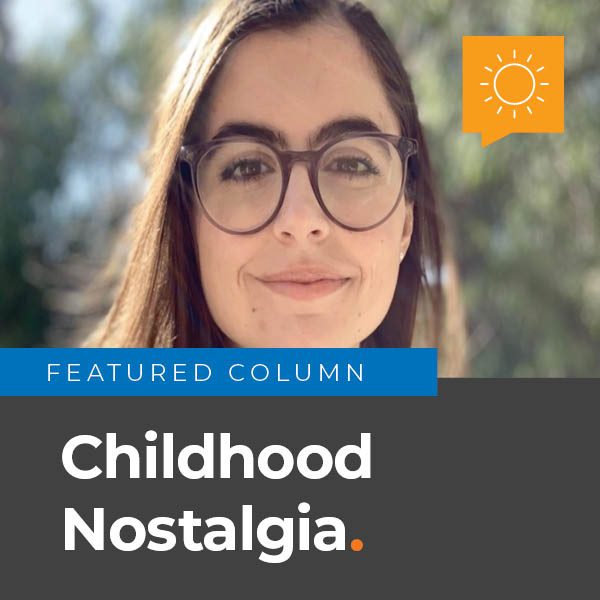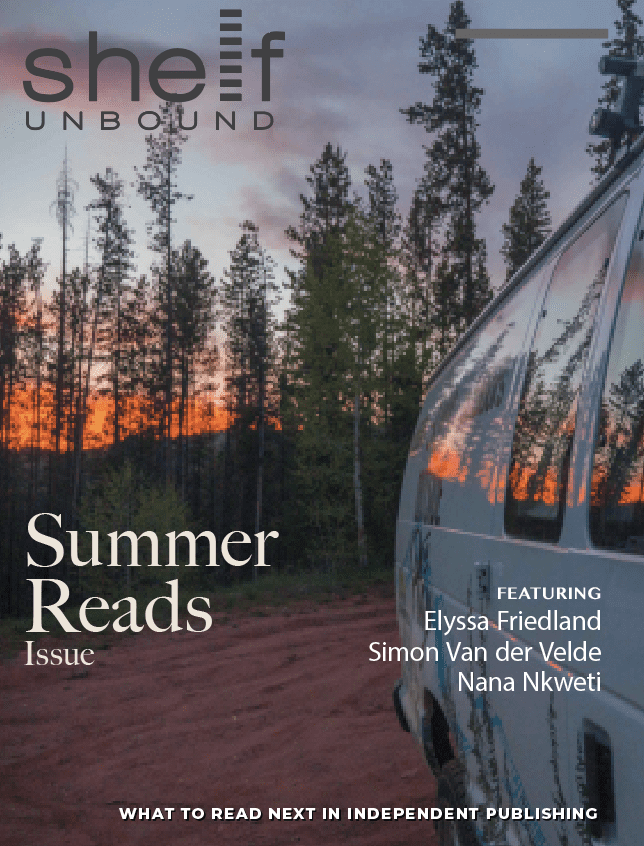BY ALYSE MGRDICHIAN

Chances are, summer is a season that holds a lot of memories for you, especially memories (hopefully fond ones) of your childhood. For example, when I think back to my summer breaks from elementary school, I remember going to the beach with my family, visiting county fairs, eating strawberry popsicles, and having all the reading time I could possibly dream of. These experiences have influenced the sorts of things I now enjoy as an adult, particularly because of the positive memories that I’ve attached to them. So, when a story is able to capture some aspect of my childhood, seasonal or otherwise, I feel so much more connected to it and invested in it, because a part of the book is a part of my past, a part of who I am as a person.
This is known as “nostalgia,” an emotion usually connected to feelings of sentimentality or wistfulness, through which we look back on happier times or places with affection. On the other side of that coin, though, nostalgia can also be pensive and melancholic, reminding us of the harder or more painful aspects of our past. In this way, nostalgia, whether wistful or melancholic, is one of the most powerful and personal emotions an author can evoke in a book, and is, unsurprisingly, very hard to pull off (especially when dealing with childhood experiences).
So, what makes childhood nostalgia so difficult to execute well in writing?
First, there is the elephant in the room—we are adults trying to write about people (i.e., children) and experiences (i.e., childhood) that are now foreign to us. As we grow up, we tend to lose touch with our younger selves, which results in many children written by adults not feeling like children at all. It’s a bit easier as an adult to write reflections on childhood from our current perspective, but that’s not the same thing as seeing the narrative through the eyes of a child. Once the focus shifts inward to the child’s mind rather than outward toward their circumstances, the characterization of the child tends to become more simplistic and unrealistic (due to a lack of understanding of the demographic). However, this inward shift is necessary to nostalgia, since what we remember is rarely the situation itself, but rather how the situation made us feel.
This shift is also necessary because, when missing (or poorly executed), it leads us to the second pitfall of writing childhood nostalgia—namely, our pasts and our memories are so personal to us, so what is nostalgic for one person may not resonate with another whatsoever. However, this only becomes an issue if you’re focusing solely on the physical experience rather than the emotional experience. Without an inward shift, the extent of a story’s nostalgia becomes something along the lines of: “Wow, you went to county fairs as a kid? That’s crazy, so did I!” This isn’t enough on its own, though. How did you feel when you went to the fair? For me, it felt like a whole other world, with Ferris wheels and clowns and halls of mirrors—I spent my earliest years in a suburban area where all the houses looked the same, and so carnivals and fairs were, for me, a Wonderland. In my mind, anything was possible in a place that looked, smelled, and sounded like a carnival did. However, a story does not have to be set in carnival for me to experience that same sort of wonder—any awe-inspiring “Wonderland” experience in a story will remind me of my own past because, even though the settings are different, the feelings those settings evoke are the same.
Given my own personal love of carnivals, it’s no small wonder that Something Wicked This Way Comes, by Ray Bradbury, is one of my favorite books. More than that, though, I view Bradbury as a great example of nostalgia done well. His stories usually follow young boys in a small Midwestern town in the ‘50s, but I 1) am a girl, 2) was born in the late ‘90s, and 3) grew up in Southern California. If I had told my mom as a child, “I’m gonna go explore with so-and-so, I’ll be back by dinner,” she would’ve had a heart attack. And yet, somehow, Bradbury wrote his child characters in a way that made me relate to them, even though there are literal decades between us.
What’s the lesson here? The lifestyles of the children you write do not have to be the same as those of your readers, so long as there are common childhood fears, mistakes, desires, and growth (i.e., inward experiences). In his work, Bradbury manages to make me feel nostalgia for a childhood I never had, due to these common internal / emotional experiences. For example, take Something Wicked This Way Comes: it follows two young boys, one of which is obsessed with the idea of growing up, while the other is content with where he is in life. However, the content boy’s father desperately wants to be young again, as do some of the other adults in the town the story is set in. Then a carnival rolls into town, with a carousel that has the power to turn time forward or back for its riders …
Reading the book as a young adult was a special experience, because I saw myself caught in the developmental stage of life between the children and the adults of the story, and so saw both my past and my future reflected in the characters. Age is the theme of the book, with adults being willing to do whatever it takes to be young again, and children wanting desperately to be grownups, and I found myself able to identify with both experiences. The way Bradbury handles the children in his stories is admirable, particularly because their desires and fears tend to be universal childhood experiences (e.g., wanting to grow up).
So, what exactly is it that makes nostalgia so powerfully effective in storytelling? As mentioned earlier, it connects us (the readers) to the story on an emotional level, because we see a piece of ourselves in it. Nostalgia also, to some degree, increases our empathy for the story’s main characters, since we find ourselves relating to their experiences, desires, and fears. This relatability and emotional investment are, arguably, only strengthened when dealing with childhood experiences, since the desires and fears of our childhood are formative in making us who we are today. While a carnival, for example, is an immediate sell for me in a story, it’s the reactions of children to the carnival that help me remember the sense of wonder and whimsy that it evoked (and still evokes) in me.
situation itself, but rather how the situation made us feel.
This shift is also necessary because, when missing (or poorly executed), it leads us to the second pitfall of writing childhood nostalgia—namely, our pasts and our memories are so personal to us, so what is nostalgic for one person may not resonate with another whatsoever. However, this only becomes an issue if you’re focusing solely on the physical experience rather than the emotional experience. Without an inward shift, the extent of a story’s nostalgia becomes something along the lines of: “Wow, you went to county fairs as a kid? That’s crazy, so did I!” This isn’t enough on its own, though. How did you feel when you went to the fair? For me, it felt like a whole other world, with Ferris wheels and clowns and halls of mirrors—I spent my earliest years in a suburban area where all the houses looked the same, and so carnivals and fairs were, for me, a Wonderland. In my mind, anything was possible in a place that looked, smelled, and sounded like a carnival did. However, a story does not have to be set in carnival for me to experience that same sort of wonder—any awe-inspiring “Wonderland” experience in a story will remind me of my own past because, even though the settings are different, the feelings those settings evoke are the same.
Given my own personal love of carnivals, it’s no small wonder that Something Wicked This Way Comes, by Ray Bradbury, is one of my favorite books. More than that, though, I view Bradbury as a great example of nostalgia done well. His stories usually follow young boys in a small Midwestern town in the ‘50s, but I 1) am a girl, 2) was born in the late ‘90s, and 3) grew up in Southern California. If I had told my mom as a child, “I’m gonna go explore with so-and-so, I’ll be back by dinner,” she would’ve had a heart attack. And yet, somehow, Bradbury wrote his child characters in a way that made me relate to them, even though there are literal decades between us.
What’s the lesson here? The lifestyles of the children you write do not have to be the same as those of your readers, so long as there are common childhood fears, mistakes, desires, and growth (i.e., inward experiences). In his work, Bradbury manages to make me feel nostalgia for a childhood I never had, due to these common internal / emotional experiences. For example, take Something Wicked This Way Comes: it follows two young boys, one of which is obsessed with the idea of growing up, while the other is content with where he is in life. However, the content boy’s father desperately wants to be young again, as do some of the other adults in the town the story is set in. Then a carnival rolls into town, with a carousel that has the power to turn time forward or back for its riders …
Reading the book as a young adult was a special experience, because I saw myself caught in the developmental stage of life between the children and the adults of the story, and so saw both my past and my future reflected in the characters. Age is the theme of the book, with adults being willing to do whatever it takes to be young again, and children wanting desperately to be grownups, and I found myself able to identify with both experiences. The way Bradbury handles the children in his stories is admirable, particularly because their desires and fears tend to be universal childhood experiences (e.g., wanting to grow up).
So, what exactly is it that makes nostalgia so powerfully effective in storytelling? As mentioned earlier, it connects us (the readers) to the story on an emotional level, because we see a piece of ourselves in it. Nostalgia also, to some degree, increases our empathy for the story’s main characters, since we find ourselves relating to their experiences, desires, and fears. This relatability and emotional investment are, arguably, only strengthened when dealing with childhood experiences, since the desires and fears of our childhood are formative in making us who we are today. While a carnival, for example, is an immediate sell for me in a story, it’s the reactions of children to the carnival that help me remember the sense of wonder and whimsy that it evoked (and still evokes) in me.
For better or worse, nostalgia makes us feel young again, and reminds us to keep in touch with and be kinder to our younger inner selves

Continue Reading…
Article originally Published in the August / September 2021 Issue: Summer Reads
